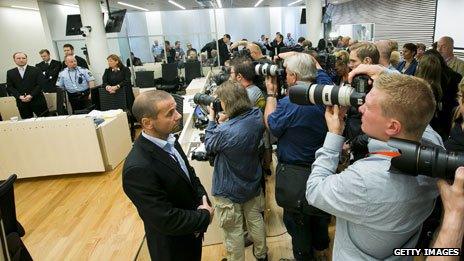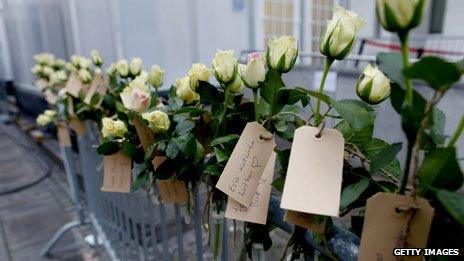Anders Breivik trial: A 10-week ordeal
- Published

All eyes in court were on one man, defendant Anders Breivik (far left)
For the families of his victims, and survivors, the 10-week trial of Anders Breivik has been deeply painful. It's also been a harrowing experience for the journalists.
On 22 July 2011, Anders Breivik killed 77 people.
The next morning I flew from Moscow to Oslo to cover the story. Once in Norway, I drove to the shores of the stunningly beautiful Lake Tirifjorden.
A boatman took me out on the crystal clear waters and we sped towards the tiny island of Utoeya. We couldn't land - there was a police cordon around the island - but we got close enough to see the body bags which the police had yet to remove.
Over the next few days I heard horrific stories from survivors, and witnessed a nation in shock and in mourning.
Nine months later I was back in Oslo, sitting in a courtroom - just two metres away from the man who'd carried out mass murder. It was the first day of his trial.
I was in the front row of the press section; Anders Breivik was sitting with his defence lawyers at a table right in front of me.
Everyone in the courtroom that day was staring at Breivik.
I stared too, partly out of disbelief that any human could do what he'd done and, partly, in an attempt to understand what kind of a person this was. Was he insane or simply evil?
I attended the trial again two weeks later; it was another opportunity to watch Breivik close-up.
What I found difficult was connecting the picture in court with the crime. As the smartly-dressed Breivik sat in the dock, responding calmly to prosecutors' questions, he looked and sounded more like an insurance salesman than a mass murderer.
He was trying to convince the court to buy his story that the slaughter had been a political act. When he described his crimes, his voice contained no hint of remorse. And when he listened to others recounting the bloodbath, his face displayed no emotion.
BBC's Steve Rosenberg: "Breivik looked more like an insurance man than a mass murderer"
From time to time he would sip water or scribble notes. Most of the time he just stared into space. It was as if Breivik had built a giant wall inside his mind to stop any feelings from squeezing through and making him crumble.
For the families of his victims, and for those who survived his attacks and who've been present in court, this trial has been a deeply painful event.

White roses with messages were left outside court, to commemorate the victims
It has been an emotional experience, too, for many of the journalists covering it. I'll never forget what happened the day Breivik spoke about his cold, calculated killing spree on Utoeya Island.
I'd left the courtroom and was watching his testimony on a large video screen in the courthouse press centre, just along the corridor. Breivik described what he admitted were "gruesome, barbaric acts".
He recalled how his victims had frozen in panic, unable to run, and how he'd calmly reloaded his gun and shot them, and how he'd tricked other young people out of their hiding places, then gunned them down too.
At that moment, I looked around the press centre. There were rows and rows of reporters, their heads buried in their laptops as they hurried to reproduce Breivik's words - and many of them were in tears at what they were having to type.
Words. The power of words. That's what I'll remember most about this trial.
Over 10 weeks, so many terrifying words have been spoken in Courtroom 250; the words of coroners in the 77 autopsy reports; detailed descriptions of how victims were hunted down and shot; words of pain from their families.
Words which journalists covering the trial have had to type, tweet, despatch and broadcast to the world.
It was often the simplest words which proved to be the most upsetting. Like the brief messages from victims' families which followed each coroner's report.
"Daddy, YOU were the best in the world."
Or this one: "She could have done so much for her family, her friends, her country. Now her dreams are buried deep in the soil".
And this message from the relatives of a 15-year-old victim: "She was a cheerful girl, always there for others. She was one of the last people killed on Utoeya. In a mobile telephone call from there she'd told her family how much she loved them."
I found that sometimes words from the Breivik trial would lie in my mind like timebombs - and only later, back at the hotel, or back home, they were detonated - and the full horror of what had been said and what had happened, would hit home.
If they'd had that effect on me, I can hardly begin to imagine what effect those words will have had on those Breivik had tried to kill, and on the families of those he DID murder.
I remember that when the first week of the trial was over, and I'd finished my reporting, I dashed off to the airport to fly back to Moscow.
Everything that day had been such a rush, there hadn't really been time for me to digest the full horror of what Breivik had been saying.
I'd transcribed his words, of course, and reported them. But oddly enough it was only once I'd made it to the airport, passed security and paused, that I was hit by a sickening feeling about what I'd been listening to.
Suddenly I spotted a children's shop with a beautiful display of coloured pencils outside. I walked up to the display and stood there, it must have been five minutes - just looking at this little island of colour and beauty.
Journalists have been given their first access to the island of Utoya
Anyone watching me must have thought I was mad. But at that moment I just wanted to experience something nice, something positive, to restore my faith in the world.
Now this trial is over and Norway awaits the final word - the judgement of the Oslo District Court.
Will the judges declare Anders Breivik criminally insane and commit him to long term psychiatric care? Or will they conclude he was mentally competent at the time of the killings and send him to prison?
Either way, Anders Breivik is expected to be locked up for the rest of his life. So does it matter where?
To Breivik it does. He maintains he's sane, he seeks a prison sentence, to burnish his claims that he is a political prisoner.
So that HIS words, against multiculturalism and Muslim immigration, are not dismissed as the words of a madman.
Broadcasting House is on BBC Radio 4 on Sunday, from 0900-1000 BST, or catch up <link> <caption>on the programme website</caption> <altText>Broadcasting House</altText> <url href="http://www.bbc.co.uk/programmes/b006qnj3" platform="highweb"/> </link>